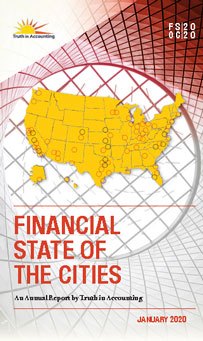
Twelve cities have more assets than obligations, a key indicator of long-term financial health. TIA designated these cities as “Sunshine Cities” because the government has money left over after all of the city’s bills are paid. Irvine, California can claim to have the best city finances in the U.S. with a $380 million surplus. If you were hypothetically to divide that figure by the number of Irvine taxpayers, each taxpayer’s share is $4,100, which is what TIA calls a Taxpayer Surplus™.
The other top five Sunshine Cities are Washington, D.C., Charlotte, Fresno and Plano. While these cities are currently in good shape, TIA cautions against assuming these surplus funds should immediately be given back to the taxpayers or used for new spending.
Future economic downturns could adversely affect future tax revenues and the value of assets being held in retirement plans, which could diminish the city’s surplus. In some cases, the excess assets are held by the city’s pension plans and must be used to pay future benefits, not for government operations or other debt.
The second piece of good news is that cities have become more transparent about their retirement debt. This gives elected officials and the public a truer picture of the government’s finances based upon the audited Comprehensive Annual Financial Reports (CAFRs). The FSOC study was based upon fiscal year 2018 CAFRs, in which the cities were required by a new accounting standard to report the vast majority of retiree health care debt on their balance sheets. Three years ago, governments using Generally Accepted Accounting Principles were required to report the pension debt on their balance sheets.
TIA found that the amount of retiree health care debt that was not reported on the 75 cities’ balance sheets dropped from more than $27.5 billion for fiscal year 2017 to less than $1 billion for fiscal year 2018.
The bad news, however, is that TIA identified 63 “Sinkhole Cities” that lack the necessary funds to pay their bills. TIA calculates a Taxpayer Burden for these cities, which is the amount of money needed to pay bills divided by the number of city taxpayers.
TIA designated New York City as the worst city with a Taxpayer Burden of $63,100. Chicago, Honolulu, Philadelphia and New Orleans round out the top five Sinkhole cities.
Taxpayer burden or surplus by city
Links on city names go to in-depth reports on each city.| Rank | City | Surplus(+) or Burden(-) Per Taxpayer |
|---|---|---|
| 1 | Irvine | +$4,100 |
| 2 | Washington, DC | +$3,500 |
| 3 | Charlotte | +$3,400 |
| 4 | Fresno | +$3,200 |
| 5 | Plano | +$2,800 |
| 6 | Stockton | +$2,600 |
| 7 | Lincoln | +$2,500 |
| 8 | Aurora | +$2,200 |
| 9 | Arlington | +$2,100 |
| 10 | Tampa | +$1,700 |
| 11 | Raleigh | +$1,400 |
| 12 | Tulsa | +$100 |
| 13 | Corpus Christi | -$300 |
| 14 | Oklahoma City | -$400 |
| 15 | Long Beach | -$500 |
| 16 | Greensboro | -$700 |
| 17 | San Antonio | -$1,100 |
| 18 | Wichita | -$1,200 |
| 19 | Louisville | -$1,300 |
| 20 | Bakersfield | -$1,600 |
| 21 | Fort Wayne | -$1,700 |
| 22 | Minneapolis | -$1,900 |
| 23 | Henderson | -$1,900 |
| 24 | Las Vegas | -$2,100 |
| 25 | Virginia Beach | -$2,100 |
| 26 | Colorado Springs | -$2,300 |
| 27 | Chula Vista | -$2,300 |
| 28 | Orlando | -$2,300 |
| 29 | Saint Paul | -$2,300 |
| 30 | Riverside | -$3,300 |
| 31 | Austin | -$3,300 |
| 32 | Indianapolis | -$3,500 |
| 33 | Memphis | -$3,700 |
| 34 | El Paso | -$3,900 |
| 35 | Los Angeles | -$4,000 |
| 36 | Toledo | -$4,100 |
| 37 | San Diego | -4,500 |
| 38 | Sacramento | -$4,600 |
| 39 | Columbus | -$4,800 |
| 40 | Cleveland | -$5,100 |
| 41 | Detroit | -$5,100 |
| 42 | Mesa | -$5,300 |
| 43 | Santa Ana | -$5,400 |
| 44 | Seattle | -$5,400 |
| 45 | Phoenix | -$5,500 |
| 46 | Albuquerque | -$5,800 |
| 47 | Anaheim | -$6,200 |
| 48 | Denver | -$6,500 |
| 49 | Omaha | -$7,100 |
| 50 | Anchorage | -$7,800 |
| 51 | Tucson | -$8,100 |
| 52 | Jacksonville | -$8,500 |
| 53 | Lexington | -$9,100 |
| 54 | Dallas | -$9,400 |
| 55 | San Jose | -$9,400 |
| 56 | Kansas City, MO | -$9,800 |
| 57 | Atlanta | -$9,900 |
| 58 | Boston | -$10,200 |
| 59 | Miami | -$10,600 |
| 60 | Houston | -$11,600 |
| 61 | Fort Worth | -$12,300 |
| 62 | Milwaukee | -$12,800 |
| 63 | St. Louis | -$14,500 |
| 64 | Pittsburgh | -$15,600 |
| 65 | Cincinnati | -$15,600 |
| 66 | Baltimore | -$16,000 |
| 67 | San Francisco | -$17,000 |
| 68 | Nashville | -$18,400 |
| 69 | Portland | -$18,400 |
| 70 | Oakland | -$18,600 |
| 71 | New Orleans | -$18,800 |
| 72 | Philadelphia | -$25,500 |
| 73 | Honolulu | -$26,400 |
| 74 | Chicago | -$37,100 |
| 75 | New York City | -$63,100 |
Taxpayer Burdens occur when politicians decide to make promises on paper without fully funding the programs. TIA emphasizes the need to fix the wording of balanced budget requirements so civil servants can count on their retirement programs, and future generations are not forced to pay for current bills.
To that end, TIA has put together some best budgeting practices called FACT-based budgeting. FACT stands for full accrual calculations and techniques. These practices help governments live up to the intentions of their balanced budget requirements. Because many governments calculate their budget on a cash-basis, debt has accumulated and current costs have been pushed onto future taxpayers. Many governments ignore millions, if not billions, of dollars of compensation costs, related to earned pension and other retirement benefits, when calculating their budgets. This is the main reason for cities’ Taxpayer Burdens.
TIA makes the Financial State of the Cities, their individual city reports and the financial data they have gathered from the CAFRs available to the public on their website Data-Z. To add context to its Taxpayer Surplus/Burden amounts, this online database contains more than 700 data series and allows users to create charts that compare cities and states using demographic, economic and financial data. The website also includes a report on the federal government and financial data for the U.S. government.









